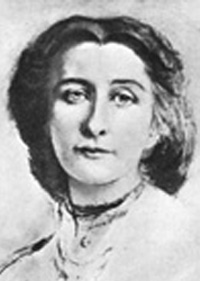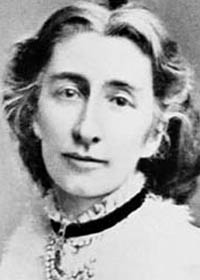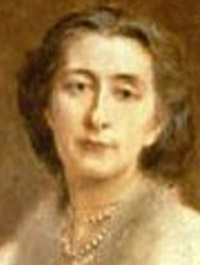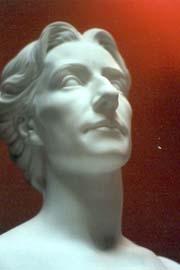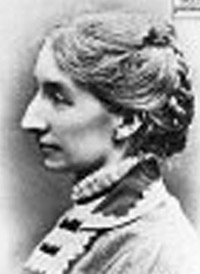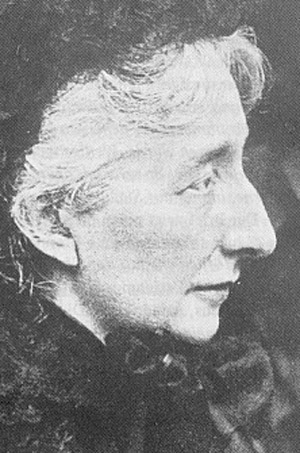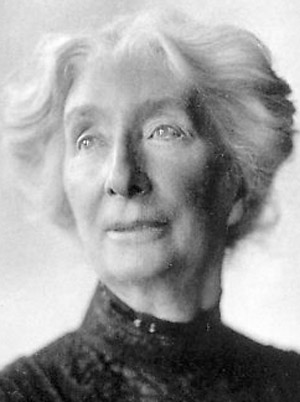Copyright Michael D. Robbins 2005
Astro-Rayological Interpretation & Charts
Quotes
Biography
Images and Physiognomic Interpretation
Cosima Liszt on her love for Richard Wagner:
Love works on us like Plutonian eruption;
it bursts through everything,
throws all strata into confusion,
raises mountains, and there it is -
utmost transformation and utmost law....
Just as I long ago renounced the sensual expression of love,
so I now resolved to sacrifice any kind of little joy,
even indeed of comfort,
in order to pay to the very last penny
for this one single nameless happiness:
to behold and to share in Richard's progress.
Cosima Wagner (December 25, 1837 -April 1, 1930) was an illegitimate daughter of the composer, Franz Liszt, but became famous as the second wife of another composer, Richard Wagner.
She was born at Bellagio, Italy, to Countess Marie d'Agoult, an author under the pen name Daniel Stern, a long-standing mistress of Liszt. In 1857, she married Hans von Bülow, an orchestral conductor, who mistreated her. It was he who introduced her to Wagner, who was many years her senior and himself already married. They became intimate in 1862, and in 1866, they set up home together at Lucerne, Switzerland. Cosima already had two children from her first marriage, and her first child by Wagner, Isolde, was born before she re-married. From 1869 to Wagner's death in 1883, she kept a diary of their life together, which was later published.Cosima Wagner--A Marriage of Devotion and Coldness
I speak now of some aspects of the marriage of Cosima Wagner, which every wife can learn a great deal from. She was the daughter of the great pianist and one of the most passionate and intense composers, Franz Liszt, but felt he was cold to her as he toured Europe. She later wrote, "I had neither mother nor father. R.[Wagner] was everything to me. He is the only one who has given me love."
When she was 18, Cosima married one of Liszt's students and a friend of Wagner's, the accomplished conductor and pianist Hans Von Bulow, with whom she had two children. While visiting Wagner's home with her new husband, Cosima fell in love with his music. And as the years passed, and there was increasingly coldness between herself and Hans, she yearned to be with Wagner, who was 24 years older than she. Ultimately they were together, and she wrote in her Diary January 1, 1869: "My love became for me a rebirth, a deliverance, a fading away of all that was trivial and bad in me, and I swore to seal it through death, through... complete devotion." [Skelton, ed.] Cosima did want to care for something big, not be confined by something cold and small in herself. About his libretto of Die Meistersinger she wrote:
...it is a masterpiece. He has affected a union between lively comedy and the sublime. Greatness hangs like a sun over the plot, in which humour is combined with the profoundest emotion, without losing any of its power. [Du Moulin-Eckart, p. 141]
"Lively comedy and the sublime," "humor and profundity" correspond to opposites, which I have learned from Aesthetic Realism are always one when something is truly beautiful--depth and lightness, meaningfulness and sportiveness.
"All beauty," Eli Siegel stated, "is a making one of opposites, and the making one of opposites is what we are going after in ourselves."
Listen to this section of Die Meistersinger. Ask if you don't hear both profundity and lightness, even humour. The violins are very busy--energetically playing runs, staccato eighth figures, and later trills and turns, which seem determinedly, good naturedly, to poke fun at the more somber, grand, and ongoing theme in the lower instruments.
[Play Die Meistersinger -- brief section -- 30 sec.]
As soon as they were together Cosima began to devote herself to having her husband's life quiet and undisturbed, so that he could write his music. With her encouragement Wagner completed the Ring series of operas for which the world is a much richer place and he was grateful to her.
Meanwhile, there was another purpose Cosima Wagner had, to own and manage what was beautiful in her husband, to have him exclusively to herself. "All of us," Eli Siegel wrote in Self and World "have an inclination to love by owning a person, in the depth of our minds." When Wagner complained, "Life was hard, Life was bitter," she became what Mr. Siegel described in me a "spiritual nurse"--buffering him from everyone, all his friends. In one biography George Marek writes:
Her possessiveness surrounded Wagner. She decided which friends to keep and which to slough off. Peter Cornelius wrote regretfully to his bride that Cosima had dug a moat between him and Wagner.... And she did not like [the pianist] Tausig, and so she issued a "papal bull against poor Tausig." [p. 74]
She made the terrible mistake many wives have made--thinking she was being "warm" to her husband by protecting him from what she thought were the "vulgarities," the criticisms, and demands of other people. She said once to Nietzsche bitterly: "What I build up with effort and love, the world tears down again."
Far from making love and marriage stronger, this shutting out of the world, making it into an enemy is the very thing that causes two people to distrust, be angry with, even despise each other. In The Right Of Ellen Reiss writes: "If two people are 'warm' to each other for the purpose of getting away from the world and of making themselves superior to the world, they will feel profoundly betrayed by each other."
This is what happened--Cosima not only agreed with, but egged on and instilled suspicions of other people. She writes in her Diary March 12, 1869:
I tell him I believe that, if his friends knew how he was living and what satisfied him, instead of being pleased they would be angry and would despise me. He thinks that is not so, and that...we would find them sympathetic. I find that hard to believe....How quiet it is here! When have two beings ever before lived for and in each other, so cut off from the world?
I have learned that this feeling that one is hurt, the desire to justify it is the most dangerous thing in the self--and from what I have read, I believe Cosima Wagner carried this attitude much further than her husband, causing her to nourish a false, viciously prejudiced attitude to Jewish people, and encourage it in him. In the Germany of Wagner's time, the last part of the 19th century that form of racism, anti-semitism, was prevalent. In an Aesthetic Realism class [7-9-91] Ellen Reiss said passionately:
Everyone would like to see himself or herself as a hurt child....As soon as you feel hurt, your ego gets free rein: you feel you've got the right to trample any fact...and be unfair to anyone. The relation of being hurt and fascism exists. Hitler capitalized on Germany being hurt.
I want to say here that Wagner's reckless scorn for people he saw as different from him--though it is thought his father was Jewish--was the worst thing about him, and it is criticized by every note, every measure of the music he himself wrote, which respects how different sounds, different melodies meet and need each other, and came from a completely different source in him. Earlier in his life Wagner had been against the aristocracy and for the people in the Revolution of 1848.
Yet, now his wife, called him her "beloved" as he read to her passages from his essay titled "Judaism in Music," which was demeaning and, I think, arose from Wagner's competition with the Jewish artists of the time--Mendelssohn and the great poet Heinrich Heine. This horrible "warmth" based on an attitude of contempt for people--caused this husband and wife to despise each other. As the years went on a friend wrote: Wagner "lashed out more and more often at Cosima with 'uncontrollable fits of rage.'" She cried a great deal. And, it is reported, that three months before Wagner died, he jumped out of bed and shouted furiously at her "You think you are virtue incarnate."
Meanwhile, even after Wagner's death, Cosima took the offensive, adding her influence and voice to the hate and contempt growing in Germany and embodied in Adolph Hitler. While her life was different from wives today, it is absolutely crucial to see the hideous results of being warm to brutal injustice and cold to what is true and kind. Whenever two people use closeness to despise, mock, denigrate other people or things--however "ordinary" it may seem--there will be hell between them.born Dec. 25, 1837, Bellagio, Lombardy, Austrian Empire [now in Italy]
died April 1, 1930, Bayreuth, Ger.
née Liszt, also called (1857–68) Cosima von Bülow
wife of the composer Richard Wagner and director of the Bayreuth Festivals from his death in 1883 to 1908.
Cosima was the illegitimate daughter of the composer-pianist Franz Liszt and the countess Marie d'Agoult, who also bore Liszt two other children. Liszt later legitimatized their births; he also provided generously for their education and, in the case of his daughters, their dowries. With her sister, Blandine, Cosima was educated in Paris by the governess of her father's mistress, Princess Wittgenstein, and then at the house of the mother of Hans von Bülow in Berlin. In 1857 she married Hans von Bülow, one of the outstanding conductors of his time and a favourite pupil of Liszt; but, though she encouraged him in his work and remained devoted to him throughout her life, their marriage proved unsatisfactory. She bore him two daughters; the two daughters subsequently born to Cosima—Isolde (1865) and Eva (1867)—were Richard Wagner's children. In 1868, Cosima with her four daughters left von Bülow and went to live with Wagner in Triebschen; they were finally married in 1870. In that year, too, Wagner composed the Siegfried Idylle to commemorate the birth of their son, Siegfried (1869–1930).
With the passing of Wagner (1883), she took upon herself the management of the Bayreuth Festivals, of which she was art director until 1908, when her son took over. To this self-imposed task she applied her characteristic energies and her continued devotion to Wagner's works. She was the moving force behind the festival plays in both commercial and social matters, influencing the selection of repertory, artists, and style of presentation. She died in Bayreuth in total blindness.

